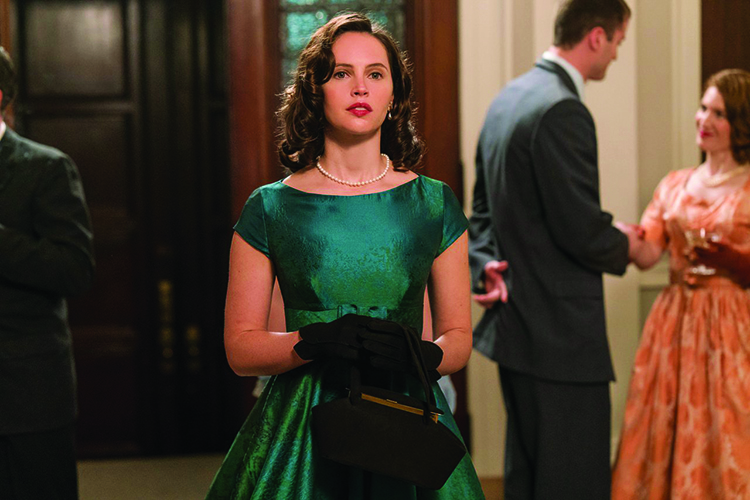‘On The Basis of Sex’ doesn’t do justice to Ruth Bader Ginsburg
Empowering story reduced to nothing more than weak scripting
permission from Focus Features
Felicity Jones as Ruth Bader Ginsburg in new biopic On The Basis of Sex
February 22, 2019
On the Basis of Sex is a dramatic biopic retelling of the world renowned feminist icon, Ruth Bader Ginsburg and her fight against gender inequality on the legal level in the late 1950s.
A film attempting to depict even a small portion of the life of Ginsburg (Felicity Jones) had fairly large shoes to fill and thankfully did not disappoint.
Ginsburg’s work from her early years as a prosecutor in the 50s, to her impact as one of only nine Supreme Court Justices has pushed her as close to a superhero as any non-flying human can get.
The accolades associated with such a powerful name are monumental changes to the legal system as a whole and the way that women are represented in that system.
The film focuses not on these accomplishments that have become well-connected with Ginsburg, but with her inability to be accepted in the workforce following her graduation from Harvard Law and the way that she forced her way into opportunities.
Knowledge that her critique against the discrimination of women would never be taken seriously, she finds a different approach to gender equality with the help of her husband Martin Ginsburg, (Armie Hammer) who happens to be a tax lawyer. The film’s main plotline centers around the clever way Ginsburg represented discrimination on the basis of sex in court and of course, her struggles doing so.
Although tax cases were not her forte, the nature of court case Moritz v. Com would invoke a pivot in not only Ginsburg’s profession but, in the lives of everyone. Apparently, Moritz took a $600 deduction for amounts he paid to a woman who helped take care of his ailing mother. However the tax treatment would be significantly better for him had he been a widower or single women under Section 214. Therefore, Moritz is the victim of gender discrimination.
The fact that this court case was not fabricated for the movie’s sake is laughable, and almost too ironic to be true. It fits the direction and underlying purpose of the movie so well, not only to glorify Ginsburg’s work but, to remind the audience that true change comes easier with the help of those in more privileged positions.
Director Mimi Leder did a great job of understanding the praise that popular culture holds for Ginsburg and curated a film that develops exactly like a superhero origin story; complete with the overwhelming task, super suit and of course the supportive eye candy that Hammer portrays.
However, there is one key difference between a biopic and a heartfelt superhero movie–the action. With the way this film was formulated it would be no surprise whatsoever if there was a long shot of the courthouse exploding in a fit of flames with Jones power walking out the doors in a slow motion shot.
It’s understandable that Leder would want to keep anticipation and interests up, especially to prevent the audience from drowning in legalese. But, in an effort to keep the audience’s focus, the film seemed to develop slightly off rhythm at times until it could regain its composure and focus again.
Although its offbeat development could also be due to the incredibly disconnected feel the writing gives the movie, often hiding behind cliches and corny quotes to attempt and distract the audience from the shallowness of the dialogue. This writing style is more than a little disappointing considering the screenwriter, Daniel Stiepleman, is the nephew of Ginsburg.
Yet, the actors on screen seem to blossom and become completely comfortable in their characters, making up for the emotional gaps the director and writer might have overlooked.
Jones does a formidable job at portraying Ginsburg but, more impressive were her reactions with her daughter Jane Ginsburg (Cailee Spaeny) whose relationship brought a sort of rawness into the film, demonstrating the ongoing responsibility current feminist have to educate the upcoming generation.
Hammer does a phenomenal job at playing the direct opposite character between the other men in the movie. Martin Ginsburg being constantly supportive and overall adorable, attracting the viewer without overly commanding the camera.
For viewers who don’t remember Ginsburg from their history classes or from Twitter, On the Basis of Sex is a perfect film to portray exactly how iconic she is without giving too many numbers and facts, making it the ultimate mix of legal biopic and drama.








